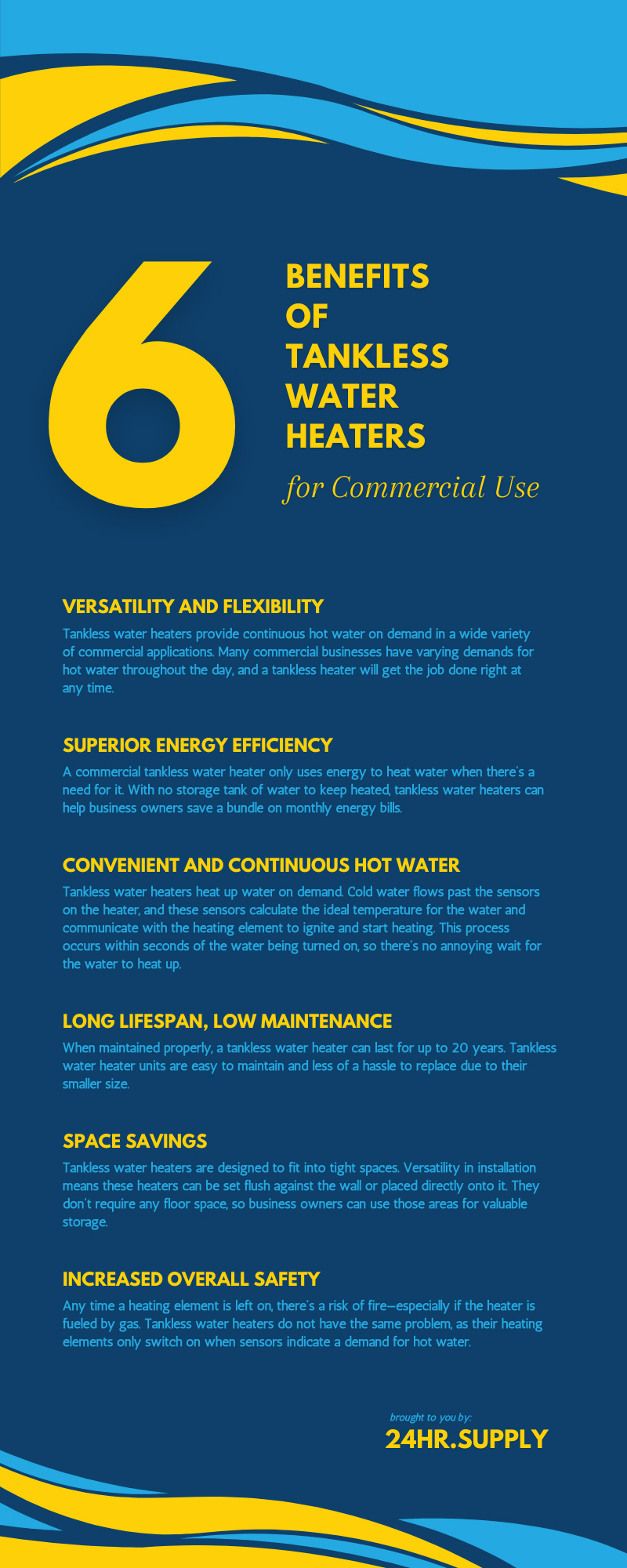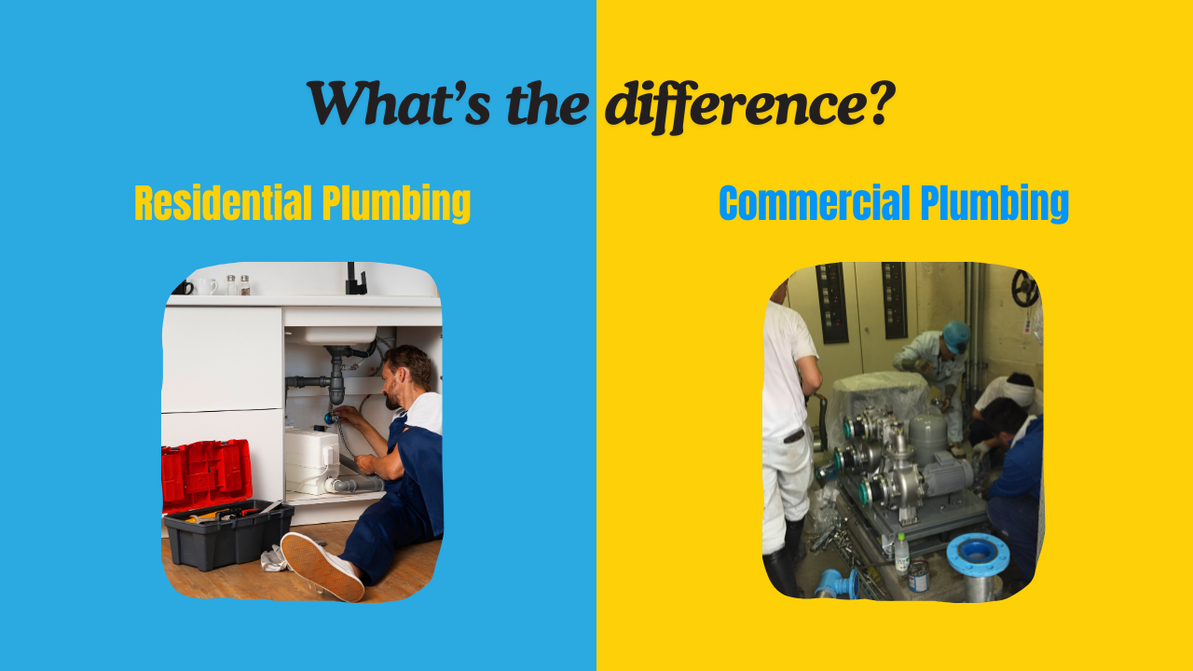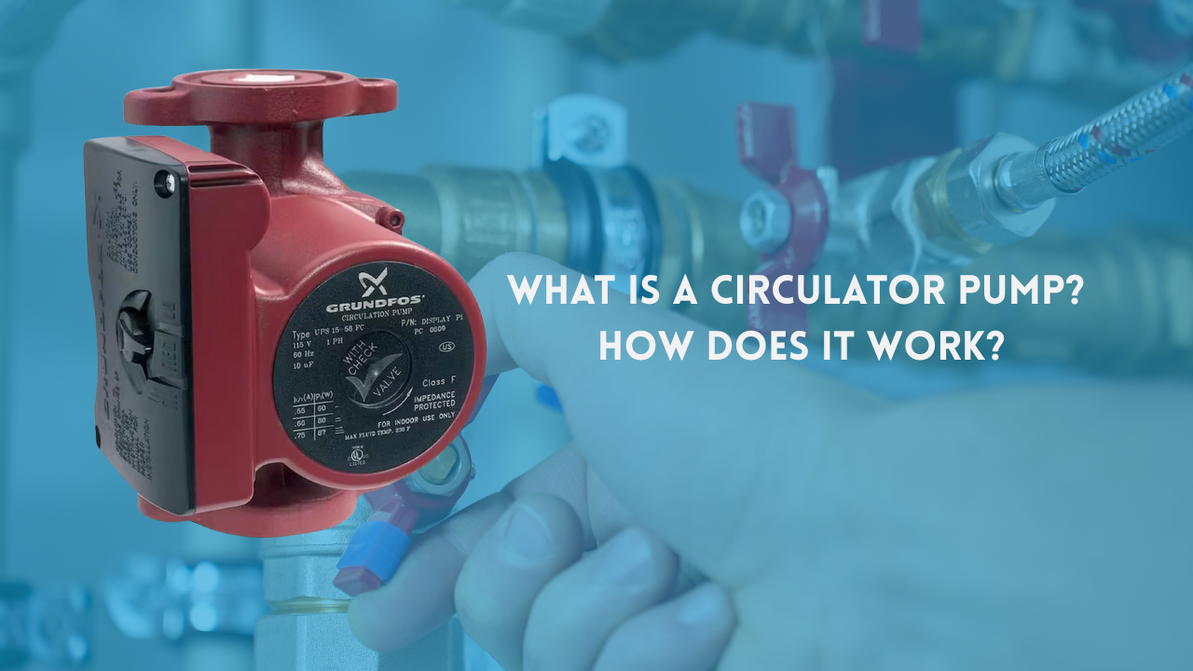6 Benefits of Tankless Water Heaters for Commercial Use
Hot water is an essential utility in commercial buildings, and water heaters often use a great deal of energy. Depending on the nature of the commercial business, there may be varying demands for hot water throughout the day. Often, a single tank-style water heater is not sufficient to meet the hot water demands of an entire commercial building.
Luckily, there are plenty of solutions available. Tankless water heaters have a variety of benefits in commercial applications, from energy savings to convenient hot water on demand for customers and staff alike. Consider the advantages of going tankless as they apply to commercial buildings.
Versatility and Flexibility
Tankless water heaters provide continuous hot water on demand in a wide variety of commercial applications. Many commercial businesses have varying demands for hot water throughout the day, and a tankless heater will get the job done right at any time. From restaurants to health clubs to hotels, many different types of commercial businesses use tankless water heating systems due to their flexibility.
For small commercial businesses, a single tankless heating unit may be sufficient to provide hot water on demand. However, many larger businesses have multiple tankless water heaters installed in various areas of the building to meet multiple hot water demands at once. For example, a large health club may have one tankless water heater installed near the jacuzzi, with another installed near the locker rooms to provide hot water for the showers.
Superior Energy Efficiency
One key difference between tankless and tank-style water heaters is the amount of energy they use to heat the water. Water heaters with storage tanks use energy to initially heat the water, then to keep the water in the storage tanks conveniently heated. That excess energy usage can add up to high monthly bills for business owners.
Meanwhile, a commercial tankless water heater only uses energy to heat water when there’s a need for it. With no storage tank of water to keep heated, tankless water heaters can help business owners save a bundle on monthly energy bills. The sensors on a tankless water heater detect when hot water is needed, and if it’s not, then the heating element remains off to save energy.
Good To Know:
Tankless water heaters with the ENERGY STAR qualification are estimated to use 25 to 40 percent less energy than their tank-style counterparts.
Convenient and Continuous Hot Water
Even though tank-style water heaters keep the water in the storage tank warm, it may still take a minute or two for the water to heat to the desired temperature. Plenty of people are familiar with the inconvenience of turning on a shower or faucet and waiting at least a minute for the water to run hot. How much water is wasted every month by letting that tap run until the water heats up?
Meanwhile, tankless water heaters heat up water on demand. Cold water flows past the sensors on the heater, and these sensors calculate the ideal temperature for the water and communicate with the heating element to ignite and start heating. This process occurs within seconds of the water being turned on, so there’s no annoying wait for the water to heat up.
Pro Tip:
If you’re working on a large commercial building with multiple fixtures and appliances that require hot water, consider installing multiple tankless water heaters. This will reduce the stress placed on any single unit and prevent water pressure problems in locations with high hot water demands.
Long Lifespan, Low Maintenance
The average tank-style water heater will last between 10 and 13 years with proper maintenance and regular repairs. Every decade or so, the business owner in question will need to haul that large storage tank out and replace it with another bulky unit.
Meanwhile, when maintained properly, a tankless water heater can last for up to 20 years. Tankless water heater units are easy to maintain and less of a hassle to replace due to their smaller size. Plus, if you install multiple tankless units around the building, the hot water demands of the commercial business will be more evenly dispersed. This means that no single unit takes all the demand, preventing it from wearing down more quickly.
Space Savings
Tank-style water heaters take up a decent amount of space wherever they’re installed. Not only does a commercial property owner need to make space for the tank itself, but the tank requires 12 inches of clearance on every side for safety and maintenance. That space, whether in a small closet or a basement storage area, can be utilized more efficiently if there isn’t a tank in the way.
Tankless water heaters, meanwhile, are designed to fit into tight spaces. Versatility in installation means these heaters can be set flush against the wall or placed directly onto it. They don’t require any floor space, so business owners can use those areas for valuable storage.
Increased Overall Safety
There are a couple of common safety risks associated with tank-style water heaters. First, the heating element in a tank-style heater is always on in order to keep the water in the storage tank heated. Any time a heating element is left on, there’s a risk of fire—especially if the heater is fueled by gas. Tankless water heaters do not have the same problem, as their heating elements only switch on when sensors indicate a demand for hot water.
In addition, if the storage tank on a conventional water heater leaks or bursts, it can cause a flood that devastates everything around it. Tankless water heaters eliminate this risk with the absence of a storage tank. Their greater overall safety contributes to their longer lifespan in comparison to tank-style water heaters.
If you are working on a commercial building with high demands for hot water, consider the multiple benefits of tankless water heaters for commercial use. Installing one or more tankless water heaters in a commercial building will improve energy efficiency, convenience, and overall safety. Not to mention, the owner of the commercial property will enjoy the benefits of going tankless as they save money on monthly energy bills and maintenance costs.

Recent Posts
-
What Causes Pipe Corrosion?
Pipe corrosion occurs when metal reacts with water, oxygen, and minerals over time. Factors that spe …Feb 2nd 2026 -
Commercial vs. Residential Plumbing: 15 Key Differences You Need to Know
Plumbing might seem straightforward at first glance, but residential and commercial systems are fund …Feb 2nd 2026 -
What Is a Circulator Pump and How Does It Work?
Water needs to keep moving efficiently in plumbing and HVAC systems, and that’s where a circulator p …Feb 2nd 2026





